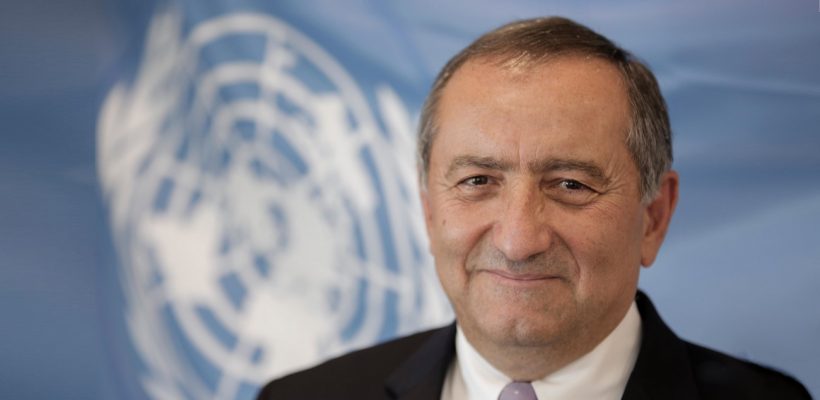
Alumni Success Story: How AUA’s MBA Program Led David Akopyan to a Career With the UNDP
5 min readDr. David Akopyan (MBA ‘93), an alumnus of the first graduating class of the American University of Armenia (AUA), is currently the United Nations Development Programme (UNDP) Resident Representative a.i. in Syria. He has served with the UNDP for over 25 years on missions in different locations, including Kyrgyzstan, Uzbekistan, Afghanistan, Somalia, Kazakhstan, and New York. In our interview, he shares about his educational experience at AUA, the challenges and rewarding moments during his career, his plans for the future, and much more.
Tell us about your background. Where are you from, where did you study, and what is your professional experience?
I was born in Kapan: my mother’s hometown and where my father was a teacher. Soon afterward, our family moved to Yerevan where I grew up, attended a typical Soviet kindergarten, then continued with my education. During my last two years of school, I studied at the Physics and Mathematics Specialized School under the Yerevan State University (YSU). Following this, I was admitted to the Faculty of Physics at YSU and continued my studies for another five years. Then, for almost 10 years, I worked in Research and Development. During that time and in addition to my work, my hobby and passion were for archaeology and natural discoveries. I was part of National Geographic Society expeditions, traveling to all regions of Armenia. Later, from 1991 to 1995 I was a member of the first Yerevan City Council, democratically elected by 6,000 people in Davidashen.
Why did you decide to pursue an MBA degree at AUA in addition to your PhD in laser physics and master’s degree in theoretical physics?
I was quite successful in my scientific work, having published almost 40 articles, and was preparing my doctoral thesis. However, in the early 90s when the Soviet Union collapsed, a new world was opening and I felt it was time for a change. So, I decided to change my profession and study about this new world and be ready to lead the change in Armenia as well as to explore the broader world.
Tell us about your educational experience at AUA. How did you benefit from it?
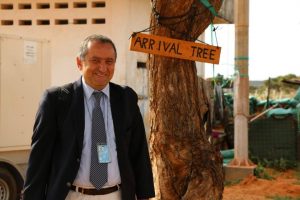 I still think pursuing an education at AUA was one of the best decisions in my life. But it wasn’t an easy one, as I had to change the life trajectory of my family and two small children. I was always keen to learn about the world behind the Iron Curtain, and AUA allowed me to do this in full: how business and the economy operate in the free world, how they are regulated by the state, and much more. I had an exciting group of classmates, wonderful teachers, and a library that had plenty of new reading materials. During this time, the internet was just in its infancy, and AUA also granted me access to this extra window to the world.
I still think pursuing an education at AUA was one of the best decisions in my life. But it wasn’t an easy one, as I had to change the life trajectory of my family and two small children. I was always keen to learn about the world behind the Iron Curtain, and AUA allowed me to do this in full: how business and the economy operate in the free world, how they are regulated by the state, and much more. I had an exciting group of classmates, wonderful teachers, and a library that had plenty of new reading materials. During this time, the internet was just in its infancy, and AUA also granted me access to this extra window to the world.
What does being a graduate of AUA’s pioneering class of ‘93 mean to you?
I am truly and eternally thankful for this life-changing opportunity that AUA and its founders gave me. In addition to the knowledge I gained, the University also showed me a different way of dealing with people – both superiors and subordinates. Whenever I have a chance to travel to Yerevan, AUA is among the first places I visit. I enjoy both the flashes of memories from my AUA days and the new amazing developments that happened at AUA in recent years.
What’s your advice to current AUA students?
Try to look beyond the current boundaries you are living and embrace the open world with all its opportunities and interesting challenges!
Focus on what you can give to the nation, to the world, and not just what the world and the nation need to give you! Serve and you will be served!
You have served with the UNDP for over two decades. What is the most important lesson you have learned during this journey?
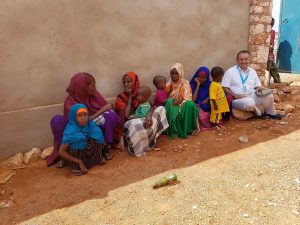 Every assignment I had in the last 25 years was an opportunity to dive deep into the context of a new nation – its history, politics, culture, economy, governance/self-organization, etc. I enjoyed those days and made fond memories and connections in each country. I met so many good people with such diverse backgrounds: Americans, Europeans, Asians, Africans, etc., belonging to all possible religions, respecting each other, and sharing similar values.
Every assignment I had in the last 25 years was an opportunity to dive deep into the context of a new nation – its history, politics, culture, economy, governance/self-organization, etc. I enjoyed those days and made fond memories and connections in each country. I met so many good people with such diverse backgrounds: Americans, Europeans, Asians, Africans, etc., belonging to all possible religions, respecting each other, and sharing similar values.
The most important lesson for me was that every nation is unique and great in its own way. From every nation, I learned so much about how to be a better human being. Sometimes, the most memorable experiences came not from meeting high-profile politicians representing the elite, but ordinary people with their passion for humanity, trust for each other, love for nature, families, communities, etc.
What has been your greatest achievement as the UNDP Country Director in Syria and now as the UNDP Resident Representative a.i. in Syria?
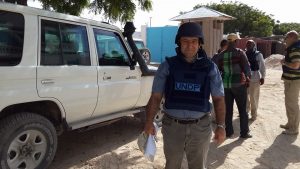 I spent three years in Afghanistan and four years in Somalia, but the last two years in Syria were probably the most difficult for me professionally – contemplating who is right and who is wrong, witnessing extremely polarized perceptions on all sides, seeing so much hatred and mistrust not only among Syrians but also all the parties involved. At the same time, millions are in deep suffering, living with virtually no hope, under terrible conditions, surrounded by rubble and debris without a functioning infrastructure. How to overcome all this and find a niche for the UNDP to deliver services and improvements for the lives of so many in deep suffering was my key preoccupation. Not an easy task, but by positioning the UNDP on the people’s side and concentrating on the short- and long-term needs of the people, I believe I managed to enact changes that will remain and expand. I was able to talk to all sides and find the right language to build a common platform in order to take the country out of the deep crisis and the people out of so much suffering. But, of course, this will not happen overnight and there is a long way to go.
I spent three years in Afghanistan and four years in Somalia, but the last two years in Syria were probably the most difficult for me professionally – contemplating who is right and who is wrong, witnessing extremely polarized perceptions on all sides, seeing so much hatred and mistrust not only among Syrians but also all the parties involved. At the same time, millions are in deep suffering, living with virtually no hope, under terrible conditions, surrounded by rubble and debris without a functioning infrastructure. How to overcome all this and find a niche for the UNDP to deliver services and improvements for the lives of so many in deep suffering was my key preoccupation. Not an easy task, but by positioning the UNDP on the people’s side and concentrating on the short- and long-term needs of the people, I believe I managed to enact changes that will remain and expand. I was able to talk to all sides and find the right language to build a common platform in order to take the country out of the deep crisis and the people out of so much suffering. But, of course, this will not happen overnight and there is a long way to go.
You have had missions in various countries including conflict zones such as Afghanistan, Somalia, and Syria. Tell us about the most challenging experience you have had.
It is hard to pick the most challenging one. But there were a few times when my colleagues and I were under attack. These were intense and life-threatening experiences that also tested my own resilience. During the first hour, I was not sure whether I would survive or not. I didn’t know what I should focus on: calling my wife and family or taking action to find my colleagues and encourage them to keep their spirits up.
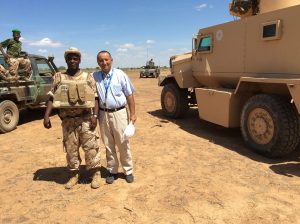 In Afghanistan, I was in charge of one of the major UN-run operations supporting national elections. Although we had a budget of $170 million, at first there were no resources, no team, and the system was not in place. Six months later, it turned into a major operation with helicopters, 10,000 polling centers, thousands of trucks and people involved. At the end, the UN Security Council praised the UNDP for one of the most successful election operations, and the special committee under US Congress recognized UNDP Afghanistan as the best UNDP office for these efforts in 2011.
In Afghanistan, I was in charge of one of the major UN-run operations supporting national elections. Although we had a budget of $170 million, at first there were no resources, no team, and the system was not in place. Six months later, it turned into a major operation with helicopters, 10,000 polling centers, thousands of trucks and people involved. At the end, the UN Security Council praised the UNDP for one of the most successful election operations, and the special committee under US Congress recognized UNDP Afghanistan as the best UNDP office for these efforts in 2011.
In Somalia, I witnessed the terrible consequences of famine that had killed 250,000 people six years earlier. My colleagues and I did our best to prevent further tragedy following the major drought that was causing another famine. I traveled extensively to all corners of the country under many security risks, trying to reach and deliver help to thousands of those who were starving, with cholera spreading at alarming speed. All that happened in early 2017, when we had just finished giving support to the major elections, state building, and federalism.
What are your plans for the near future?
After 10 years serving in conflict zones, I will soon transition to a new country as the UNDP Resident Representative. I am always open to discovering new realities and I look forward to applying my experience and knowledge in new places. I also plan to shift to part-time teaching and share my experience. I would be happy to engage more with the new generation of AUA students.
